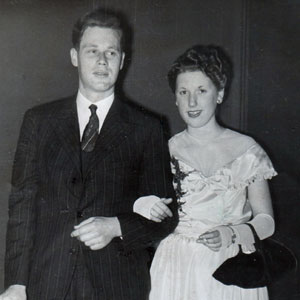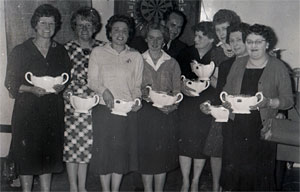
Exeter Stories
Exeter folk and friends in their own words - │ << Previous story │ Next story >> │
Also see Eagle Tavern history
Syd Rowsell - Running the Eagle Tavern
On this web site there is much interest in pubs, but there is no account from anyone who ran a pub in the City. I thought it appropriate to put my views on paper, so that you can appreciate what drinking is all about from the other prospective.
There is also a growing belief, that in the age of the small back street pubs, they were wonderful social community centres, dispensing locally brewed real ales of exceptional quality. I think this comes because of a poor memory of what things were really like. Opening hours were restricted 11am to 2pm and 5 to 10pm (10.30pm in the summer) In 1966 there were 108 pubs in the City, which at that time, did not include Alphington, Pinhoe or Topsham.
The Eagle Tavern had been a pub in Howell Road for many years before the First World War, it was strategically placed directly outside the main gates of the Higher Barracks, attracting generations of Soldiers as its regular customers. The tenancy of the pub was in the same family for 62 years .
In 1913, on completion of regular service with the Devonshire Regiment, Colour Sergeant Charlie Lane and his wife Rosa, acquired the licence, their daughter Minnie married Dick Green a member of the Royal Artillery stationed at the Higher Barracks, and on the death of her parents they became the tenants.
A new boy in the City
I came to Exeter in 1946. I was in the army and was stationed at Higher Barracks in Howell Road. Like many soldiers before me, I used to enjoy a beer in the Eagle Tavern - the building is still there but sadly the pub closed in 2007.
When I arrived the pub was tenanted from Heavitree Breweries by Dick and Minnie Green, they had an attractive daughter called Joan who sometimes worked behind the bar, the pub being outside the barrack gate, soon became my “local”. The beer was good and I rather fancied the bar maid.
As good fortune, Joan liked me as well, we were soon stepping out together and eventually we married in 1951 My engagement with the Army ended in 1948 and I joined the Exeter City Police Force in 1951 and served until 1973 (photo)
Dick Green, my father in law ran the Eagle Tavern until 1973, when the brewery offered me the tenancy, mainly because Joan my wife, had worked there for many years, between raising our children.
Despite the current belief that in the good old days, the beer was wonderful “real ale” that sold itself, the truth was somewhat different. Keg beer was introduced because of the poor quality of most local brewers beer. Before the introduction of keg beer it was common for drinkers to order a pint of Light and Bitter, or Brown and Mild. If you were in a pub where this was the popular drink, it was a sure indication that either the brewer or the landlord were inferior and the draught beer was not of a very good standard.
Drinkers were demanding consistent quality and it could be obtained through pasteurised and pressurised beer, kept in kegs. Only with hard work and fastidiousness could you guarantee the quality of beer from brewers such as Heavitree Brewery, it was the same all over the country. The variable quality of the beer on offer led to the change in drinking habits and the popularity of national brands of lager.
Dick had been a superb landlord of the “old school” In his youth he had been an engineer, he applied some of these skills in the pub. The pub had no cellar, the barrels of beer were lined up behind the bar, on a trestle like shelf, they were connected by pipes to beer engines on the bar. Each barrel was supported on a converted car jack which enabled the barrel to be tilted when required, without movement to disturb the sediment, which is inevitable in real ale.
Dick had made his own brass pressure valves, which were inserted in the top of each barrel, most landlords left the “spile” in loose to aid flow. (If this method was used, it meant that the stale tobacco filled air of the pub would also be in the barrels, and would not assist the quality of the beer.) All his efforts meant that the very best pint of Heavitree beer could be served every time.
Cider or scrumpy
A great deal of cider was sold in the pub, this was not the bottled or keg cider popular today, but was farm style unsophisticated stuff, often with apple bits and pieces still floating in it. In pubs with a mixed beer and cider throughput, it is essential to keep the two well separated, Dick had a rule that he would only dispense cider in a certain type of glass, which were never used for any other beverage.
It is now difficult to imagine, that it was unusual for women to enter pubs, even with their husband. Some pubs refused to serve women in certain bars.
This was not the case at the Eagle Tavern, Minnie
Green was instrumental in forming a Lady’s Darts Team and
encouraging the locals to use the pub. Her drive and enthusiasm led to
the formation of a Lady’s Darts League in the City
When I
took on the pub, we had one main room which had
two dart boards and a queue to play “the winner”. There was
a small room behind the bar where we had a genuine
“shove’apenny board” permanently covered in French
chalk, where local experts in the art could challenge all comers.
There was a “lounge” which was a small room off the main bar. The idea was that if you took your wife to the pub, she may not like the raucous behaviour of the men in the bar, so the genteel atmosphere of the lounge may be more appropriate.
In reality, a lounge was required under the strange licensing laws of the time. A full licence to sell wines and spirits, as well as beer, required that you had two rooms. Later when Fruit Machines appeared in pubs, it was requirement that one room did not have any machines.
Most of the small pubs in the city had a second room, a cheerless, cold, sparsely furnished haven, which could be used by Spartan drinkers offended by the patrons of the bar. They were rarely if ever used.
Similarly, most local pubs had a cubicle with a serving hatch to the bar, this was called the “jug and bottle”, where women could go to get served, another relic from a few years earlier when you rarely saw a woman in a pub, other than the bar maid.
Jug and bottle
The “jug and bottle” was often considered the haunt of secret boozers, they could pop in and collect a few bottles, or bring a jug which could be filled with draught beer. It was the recognised place where father could send one of the kids to collect the beer and cigarettes. But in those far from enlightened times, the Magistrates who controlled pubs, would have frowned on us selling anything which appealed to children.
Also
remember that before about 1970, alcohol was not sold in grocery shops.
In the City centre, there were perhaps half a dozen wine merchants who
sold wines and spirits, but they did not sell beer. Spread about the
City there were also about half a dozen “off licence” shops
which sold a full range of alcoholic drinks, and were open during
licensed hours. These were the only shops open in the evenings, all
other shops closed at 5.30p.m. The Off Licences were dotted about,
there was one in Park Place, Heavitree, another at Lions Holt, St
James, and one in Richmond Road.
Before the revolution which
enabled grocers to sell booze, most chemist shops had the right to sell
alcohol, but few of them did.
Most of the small brewers, like Heavitree, also supplied vinegar, or at least the product now known as “non brewed condiment” or “chip shop vinegar”. When I kept the Eagle Tavern, it was delivered in small barrels and I sold it by the pint. By this time the Brewery had stopped making it, and it was supplied by EDE’S. who are still famed for their pickled onions.
Syd Rowsell is a retired police officer.
 Syd and Joan Rowsell on their wedding
day.
Syd and Joan Rowsell on their wedding
day. Dick Green, landlord of the Eagle Tavern.
Dick Green, landlord of the Eagle Tavern. The Eagle Tavern ladies darts team.
The Eagle Tavern ladies darts team.
The new Queen On 6th February 1952 King George VI died. Syd was a young police constable on early shift when the news arrived at the police station. He was ordered to visit Tom Farrant, the senior mace sergeant, who lived in Ladysmith Road, to tell him to immediately go to the Guildhall to enable the Mayor, Fred Cottey to proclaim the new Queen Elizabeth. Thus, he became a small link in the chain that ensured the continuity of the monarchy.
│ Top of Page │